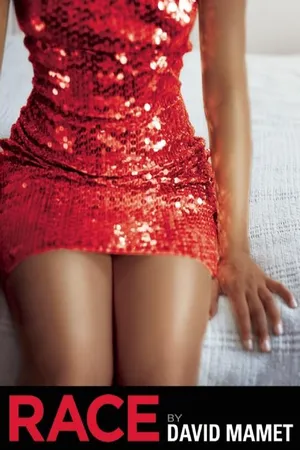![]()
SCENE ONE
An office.
Jack, Henry, Charles and Susan onstage.
HENRY: Sit down.
(Charles holds an overcoat, which Susan takes from him. Charles sits.)
You want to tell me about black folks? I’ll help you: O.J. Was guilty. Rodney King was in the wrong place, but the police have the right to use force. Malcolm X. Was noble when he renounced violence. Prior to that he was misguided. Dr. King was, of course, a saint. He was killed by a jealous husband, and you had a maid when you were young who was better to you than your mother. She raised you. You’ve never fucked a black girl, but one sat near you in science class, and she was actually rather shy.
(Pause.)
CHARLES: . . . I would never say any of . . .
HENRY: You’re fucking A right you wouldn’t. Which is the purpose of the lesson. Do you know what you can say? To a black man. On the subject of race?
CHARLES: “Nothing.”
HENRY: That is correct.
CHARLES: Black people can talk about Race.
HENRY: How about that.
CHARLES: I will do anything I can. To wipe the slate clean.
JACK: You cannot wipe the slate clean.
HENRY: Mmm-hmm.
JACK: You say it isn’t fair? It is neither fair nor unfair. None of us is immune. From a false accusation.
CHARLES: You know it is false?
JACK: I will assume that it is false.
CHARLES: Why?
JACK: Because you will be paying us to support that assumption.
CHARLES: And if I were not paying you?
JACK: I would assume that you are guilty.
CHARLES: Why?
JACK: Because it makes a better story.
HENRY: World goes to sleep at night Mr. Strickland. Wakes up and it needs two things. A cup of coffee and some vicious gossip.
CHARLES: And you can change the world.
HENRY: No one can change the world.
CHARLES: But you could perhaps change. The outcome in this instance, of that accusation.
JACK: You would be paying us for our ability. In good faith. To extend all our powers. To attempt to do so.
CHARLES: In a cause in which you did not believe.
JACK: Belief. Cannot be controlled. One believes. People are good, people are bad. God exists. Or the Mob killed Kennedy. The appearance of belief. May be induced or extorted. People may be: coerced, seduced or suborned, into momentarily acting against their beliefs.
CHARLES: “Induced or extorted.”
HENRY: The Law, Mr. Strickland, is not an exercise in metaphysics. But an alley fight.
JACK: Why are you here?
CHARLES: I want your help.
JACK: “But—?”
CHARLES: But I would like you to believe me.
JACK: Why?
CHARLES: Because I feel that would make you more effective advocates.
JACK: Let me enlighten you. “Belief,” sir, hamstrings the advocate. Who is, then, “anchored to the facts.” I “believe” in the process. Whereby: each side is permitted. To engage an attorney. Does this find the truth? Neither side wants the truth. Each wants to prevail. Does society “deserve” the truth? Alright. Will they get it? Never. Why? As the truth is in doubt even to the litigants. Each of whom will lie first to himself, then to his attorney, and then to the court, to bring about an outcome which he deems just. Which is to say, “victory.” You understand? And, on the scaffold, the condemned man having lied to his lawyer, the judge, and himself, will then lie to God. That is the long speech. The short speech is: you came here because you think that we can help you. Perhaps we can. What can you do?
CHARLES: Alright.
JACK: Listen to our instructions, obey them—and cultivate the appearance of contrition.
CHARLES: I didn’t do anything.
HENRY: You’re white.
CHARLES: Is that a crime?
HENRY: In this instance.
dp n="14" folio="8" ? CHARLES: You’re kidding.
HENRY: Sadly I am not.
CHARLES (To Henry): Do you care that I’m white?
HENRY: “Do I hate white folks?” Z’at your question? “Do all black people hate whites?” Let me put your mind at rest. You bet we do. White folks are “scared”? All to the good. You understand? We’re thrilled you’re guilty.
CHARLES: I’m guilty.
HENRY: Yes.
CHARLES: Because I’m white.
HENRY: No. Because of the calendar. Fifty years ago. You’re white? Same case. Same facts. You’re innocent. (Pause) This is the situation. In which you discover yourself.
CHARLES: I understand. You’re testing me. I understand.
HENRY: I’m not “testing” you, sir. I’m telling you the truth. Your people, if t...




